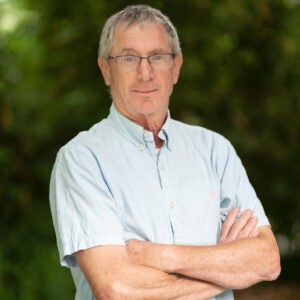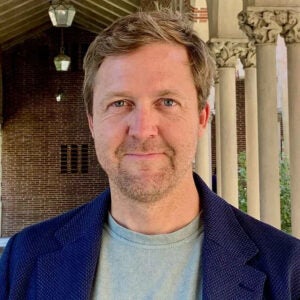Wrigley Institute Names 2024 Faculty Innovation Award Winners
The Wrigley Institute for Environment and Sustainability (WIES) has named its 2024-2026 cohort of Faculty Innovation Award winners. The awards, worth up to $50,000 each, support original, solutions-focused environmental and sustainability research by USC faculty from any school.
This year’s awardees conduct research across both the natural and social sciences, in the fields of Earth sciences, marine and environmental biology, and economics. Three of the researchers in the cohort are receiving grants under WIES’s new Climate and Carbon Management Initiative, which explores strategies for decarbonizing the world’s economies and our atmosphere.
“Research universities like USC are a crucial proving ground for novel solutions to environmental and sustainability challenges,” says Wrigley Institute Executive Director Jessica Dutton. “Our Faculty Innovation Awards are designed to help make early-stage investigations of these solutions possible.”
2024-2026 Faculty Innovation Award Winners
Paxson H. Offield Professor in Coastal and Marine Systems and Professor of Earth Sciences, Environmental Studies, and Spatial Sciences
Project: “How will Alkalinity Addition to the Ocean Impact Carbon Cycling?”*
Researchers are exploring ways of reducing planet-harming CO2 levels by capturing carbon at the point of emission (such as from the smokestacks of factories or ships) or removing existing carbon from the atmosphere. For these solutions to be effective, this captured carbon must be stored somewhere, and the ocean is a possible location. However, the addition of carbon to our oceans could touch off chemical reactions that alter marine ecosystems, which are crucial to our planet’s health. Berelson’s Faculty Innovation Award will fund a study into the possible effects on marine ecosystems of CO2 that has been captured, neutralized through a chemical reaction, and diluted before being placed in the ocean. The results will help uncover whether large-scale, ocean-based carbon storage is workable as a potential solution to the climate crisis. “There is much to learn about how our inputs to the ocean, either as CO2 or alkalinity, will impact ocean ecosystems,” Berelson says.
Associate Professor of Earth Sciences
Project: “Developing Temperature Sensitive Ion Exchange Resins to Speed Carbonate Dissolution”*
Many solutions for reducing the planet-warming carbon dioxide (CO2) in Earth’s atmosphere rely on capturing CO2 and subjecting it to a process called alkalinizing. This process uses water to neutralize acidic CO2 through a chemical reaction, so that carbon can be safely stored where it no longer contributes to climate change. The most popular alkalinizing reactions, however, work too slowly to be effective at staving off the worst effects of climate change. John’s Faculty Innovation Award will fund testing of new ion exchange resins that show promise for accelerating the pace of alkalinizing reactions. The results can help point the way to more effective solutions for protecting both humans and our planet’s ecosystems from the devastating effects of extreme warming.
Professor of Economics and Spatial Sciences
Project: “Rainwater harvesting in urban settings as a response to water shortages”
As climate change accelerates, water scarcity is becoming an increasingly urgent issue, especially in the planet’s megacities. In Mexico City, home to 8.8 million people, one-third of the population only has access to water during limited hours. In an attempt to improve the situation, the Mexico City government has begun to provide especially vulnerable households with rainwater harvesting systems, but residents are not using the systems to capacity. Oliva’s Faculty Innovation Award will help fund a large-scale study to pinpoint the different ways these households obtain water, barriers that interfere with full use of the rainwater systems, and interventions that might help increase rainwater system use. Results will help inform water-security initiatives not only in Mexico City, but in other large, urban areas affected by water scarcity.
 Cameron Thrash (with Felipe de Barros and David Bañuelas)
Cameron Thrash (with Felipe de Barros and David Bañuelas)
Associate Professor of Biological Sciences
Project: “The Role of Estuarine Bacteria in Blue Carbon Capture Amid Rising Seas in Southern California”*
Coastal ecosystems play a key role in absorbing and sequestering the greenhouse gasses (GHGs)–such as carbon and methane–that cause climate change, thanks in part to specialized bacteria that help process and trap GHGs. However, rising sea levels may affect these bacteria populations and interfere with their ability to aid in GHG sequestration. This, in turn, could result in increased amounts of GHGs being released into the atmosphere from ecosystems such as river estuaries, salt marshes, and mud flats. Thrash’s Faculty Innovation Award will fund a study of the effects of sea level rise on GHG-processing bacteria in the Upper Newport Bay Ecological Reserve, Southern California’s largest tidal salt marsh. Findings will help inform conservation, restoration, and policy decisions that affect the GHG-sequestering abilities of the reserve and ecosystems like it.
*Funded under the Climate and Carbon Initiative


